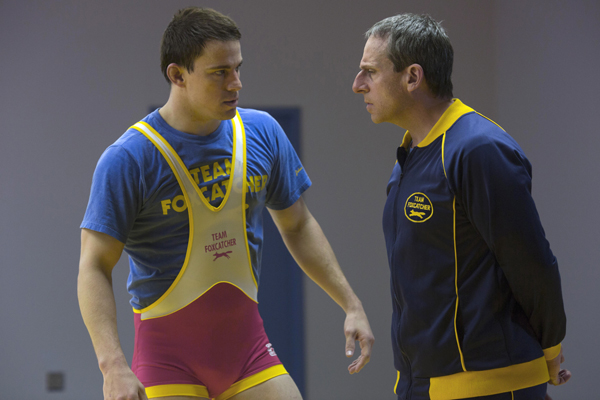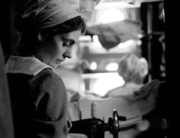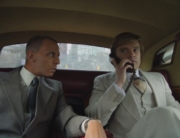The American entry in this year’s Cannes Film Festival competition, Foxcatcher, overcame the speculative buzz from its postponement of its release last year. It went on to win Bennett Miller the best director award and was generally held in respectful regard on the Croisette. However, it’s a low-key, chilly film that will have a challenge maintaining its glow all through the awards season.
Unlike two other films at the festival based on real-life subjects, Mr. Turner and Saint Laurent, this work takes a broader focus, with pointed jabs here and there at class in America (see the buff Channing Tatum as a broke athlete resort to eating fast food). However, it withholds a knockout punch. Miller softly underlines the disparity between Mark Schultz, a young gold medal–winning but cash-poor wrestler, and the one percent of the one percent, John E. du Pont of the chemical conglomerate dynasty. This isn’t by most definitions a biopic, but it becomes one by default, as it centers on the baffling behavior of du Pont heir, convicted for the 1996 murder of Dave Schultz, a coach on the U.S. Olympic wrestling team. (Is a spoiler alert really necessary?)
Tatum stars as Mark, the vortex in a triangle of sorts. In the beginning, he makes ends meet (earning $20) giving pep talks to barely attentive elementary school kids before he receives a phone call in his bare, utilitarian apartment from a stranger, du Pont, requesting face-to-face time. With a ticket paid by the would-be benefactor, Mark flies cross-country to Pennsylvania to the Arcadian du Pont estate, Foxcatcher Farm, where the multimillionaire (Steve Carell) makes a heavy appeal to the athlete’s patriotism: “Kids need a role model.” With little reflection, Mark accepts the no-brainer offer: free room and board and $25,000 annual salary to train for the 1988 Olympics in a du Pont–funded facility on the estate grounds, just a few minutes’ drive from the family’s manse.
First, one house rule: John firmly advises Mark to allow du Pont’s mother, Jean, her space. Mother and son live separate lives: she has her prized horses, he has his wrestling pads. A man of varied interests, du Pont had trained for the Olympic pentathlon, written many books on North American birds, and served as a benefactor for right-wing political action groups before he, in his mid-fifties, became a cheerleader for wrestling. Jean’s perplexed by this newfound enthusiasm. In one of the most direct, upfront scenes, she cautions him that she doesn’t want him to be brought “low” by the sport. Behind her back, he tells Mark that horses are stupid, sounding more like an irritable 10-year-old than a 55-year-old with liver spots.
Of all of the relationships depicted here, the mother/son jousting is the most lucid and brittle, though the film takes liberties with the real-life time line; Jean had died by the time John put his energy and big bucks into promoting wrestling, going so far as to hire Mark’s brother, the hesitant family man Dave, as a coach. (Mark and Dave were the first siblings to win gold medals at the both the Olympic and World games.) As the older mentor, Mark Ruffalo singlehandedly brings bonhomie lightness to the sense of foreboding. (When the brothers live on the du Pont estate, the sense of years passing is also fuzzy.)
With a diffused point of view, the film doesn’t pinpoint a specific motive for the murder or make a definitive statement, though a lot is implied. Blessed with money—and, thus, power—du Pont begins to play favorites, playing one Schultz off of the other. When du Pont comes to the practice room, the jock banter is forced and the reactions of the young athletes are obligatory. It’s hard to be part of the team when you’re footing the bills—not to mention that du Pont’s more than 30 years older and he won’t let anyone forget who’s calling the shots. He even calls Mark for a practice session in the middle of the night. Foxcatcher is a world unto its own.
Dave focuses on the wrestling matches, while Mark is putty in du Pont’s hands, easily stoked by approval or dejected by reprimands. The conflict underlining this wobbly triangle could come from a number of possibilities: a lopsided bromance, sexual tension, or alpha male competition. The just-the-facts tone only suggests reasons for the shooting death that sent du Pont to prison, where he died in 2010, which lessens the impact. The mind wonders to what a more confrontational or flippant filmmaker would have done with this material—especially when it comes to the Greco-Roman matches.
Physically, Tatum fits the part, of course, as a star wrestler, yet it’s not quite a breakout performance but a very self-contained one, and not in the same league as Carell’s. The poker-faced Tatum doesn’t offer nearly as many possible motives in this whydunit. No other character, as portrayed here, changes as much as Mark, an all-American jock seduced by easy comfort, cocaine, and blond highlights, yet Tatum remains taciturn, a blank slate.
The film’s focus shifts toward Mark’s mentor, the erratic and petulant du Pont, the role with the most dimensions. All of his character’s complexity comes through, even though the actor is slightly buried underneath latex, old-age make-up and a larger prosthetic schnoz. The choice of makeup evokes the awards-attracting turn Douglas Carter Bean derided in his satiric Broadway play The Little Dog Laughed, where a mercenary talent agent aptly describes one way to awards victory: “Put the big nose on the pretty lady.” Though Carell is no Nicole Kidman in The Hours, he comes close.
Beneath the makeup, Carell has his harsh, vacant stare down pat after playing Michael Scott in TV’s The Office. Scott always had a selfish, prickly side that was barely concealed by his smarmy humor; here, Carell lets it all hang out. Though restrained, this performance matches the mood. The film’s best weapon, though, is its strategic use of Vanessa Redgrave as du Pont’s judgmental and frail mother, a part that was largely improvised. Wheelchair-bound in oversize Chanel suits, Redgrave shrinks before viewers’ eyes.
In its favor, Foxcatcher retains a sense of mystery, and Miller never overindulges. He depicts this lurid tale of ego, money, ambition, and—possibly—sex (though it’s only hinted at) as a step-by-step two-hour setup of a crime: nothing is out of place. The gloomy art direction, combined with the cinematography, captures the time warp of the Foxcatcher estate, designed when American Colonial was the hot trend and a doily would have been considered au courant. Shrouded in mystery, it’s the American Manderley.







Leave A Comment